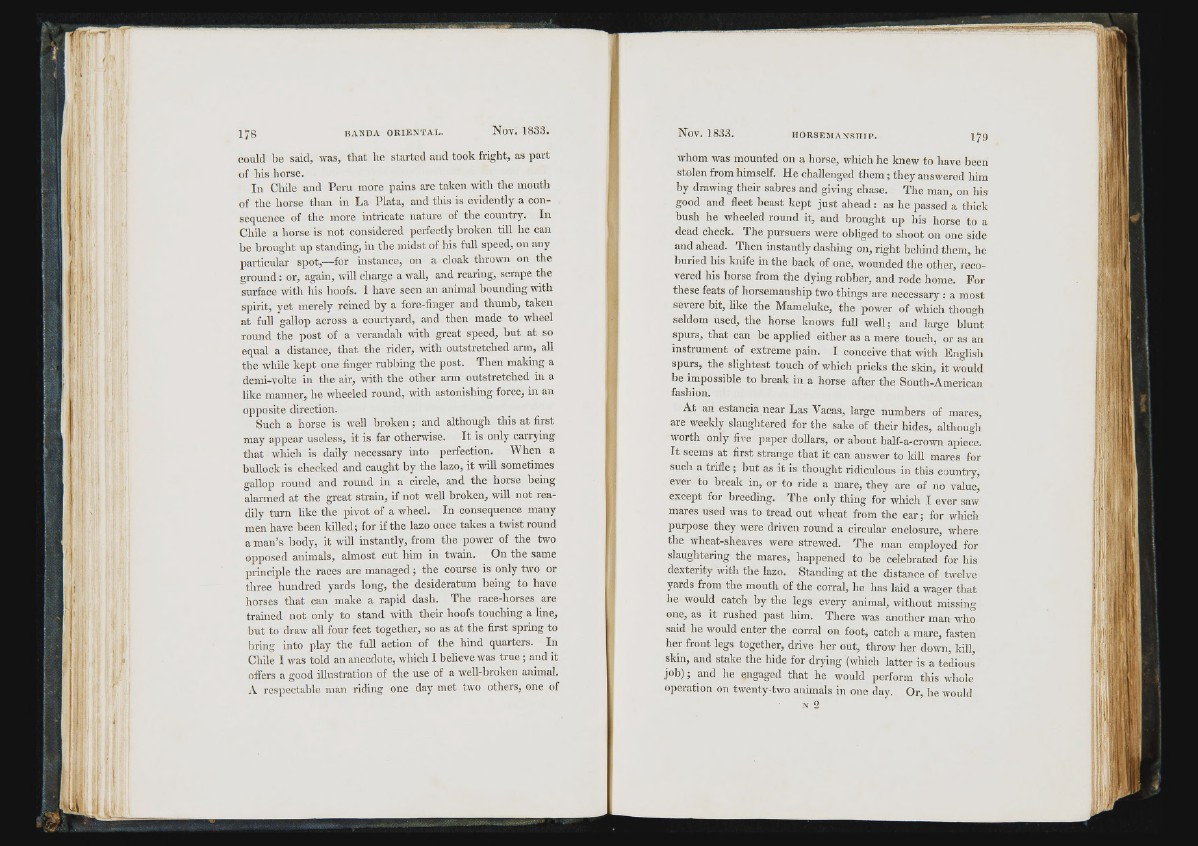
¿1 1 , ,
could be said, was, that he started and took fright, as part
of his horse.
In Chile and Peru more pains are taken with the mouth
of the horse than in La Plata, and this is evidently a consequence
of the more intricate nature of the country. In
Chile a horse is not considered perfectly broken till he can
be brought up standing, in the midst of his full speed, on any
particular spot,—for instance, on a cloak thrown on the
ground: or, again, will charge a wall, and rearing, scrape the
surface with his hoofs. I have seen an animal bounding with
spirit, yet merely reined by a fore-finger and thumb, taken
at full gallop across a courtyard, and then made to wheel
round the post of a verandah with great speed, but at so
equal a distance, that the rider, -nfith outstretched arm, all
the while kept one finger rubbing the post. Then making a
demi-volte in the air, with the other arm outstretched in a
like manner, he wheeled round, with astonishing force, in an
opposite direction.
Such a horse is well broken; and although this at first
may appear useless, it is far otherwise. It is only carrjing
that which is daily necessary into perfection. When a
bullock is checked and caught by the lazo, it will sometimes
gallop round and round in a circle, and the horse being
alarmed at the great strain, if not well broken, will not readily
turn like the pivot of a wheel. In consequence many
men have been killed; for if the lazo once takes a twist round
a man’s body, it vnll instantly, from the power of the two
opposed animals, almost cut him in twain. On the same
principle the races are managed; the course is only two or
three hundred yards long, the desideratum being to have
horses that can make a rapid dash. The race-horses are
trained not only to stand with their hoofs touching a line,
but to draw all four feet together, so as at the first spring to
bring into play the full action of the hind quarters. In
Chile I was told an anecdote, which I believe was true; and it
offers a good illustration of the use of a well-broken animal.
A respectable man riding one day met two others, one of
f l
whom was mounted on a horse, which he knew to have been
stolen from himself. He challenged them ; they answered him
by drawing their sabres and giving chase. The man, on his
good and fleet beast kept just ahead: as he passed a thick
bush he wheeled round it, and brought up his horse to a
dead check. The pursuers were obliged to shoot on one side
and ahead. Then instantly dashing on, right behind them, he
buried his knife in the back of one, wounded the other, recovered
his horse from the dying robber, and rode home. Por
these feats of horsemanship two things are necessary : a most
severe bit, like the Mameluke, the power of which though
seldom used, the horse knows full well; and large blunt
spurs, that can be applied either as a mere touch, or as an
instrument of extreme pain. I conceive that with English
spurs, the slightest touch of which pricks the skin, it would
be impossible to break in a horse after the South-Araerican
fashion.
At an estancia near Las Vacas, large numbers of mares,
are weekly slaughtered for the sake of their hides, although
M’orth only five paper dollars, or about half-a-erown apiece.
It seems at first strange that it can answer to kill mares for
such a trifle; but as it is thought ridiculous in this country,
ever to break in, or to ride a mare, they are of no value,
except for breeding. The only thing for which I ever saw
mares used was to tread out wheat from the ear; for which
purpose they were driven round a circular enclosure, where
the wheat-sheaves were strewed. The man employed for
slaughtering the mares, happened to be celebrated for his
dexterity with the lazo. Standing at the distance of twelve
yards from the mouth of the corral, he has laid a wager that
he would catch by the legs every animal, without missing-
one, as it rushed past him. There was another man who
said he would enter the corral on foot, catch a mare, fasten
her front legs together, drive her out, throw her down, kill,
skin, and stake the hide for drying (which latter is a tedious
job ); and he engaged that he would perform this whole
operation on twenty-two animals in one day. Or, he would